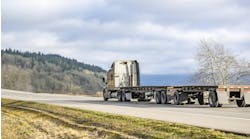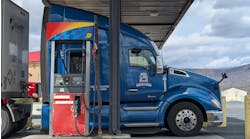As some industry leaders ramped up concerns about overly stringent emissions regulations throughout 2023, fleets got a slight reprieve from the California Air Resources Board before the year ended. CARB extended the reporting deadline for its Clean Truck Check program to Jan. 31 for heavy-duty truck owners and operators.
The extension grants fleet owners and operators an additional month to enter their vehicles and personal information into the Clean Truck Check-Vehicle Inspection System (CTC-VIS) database, finalize initial reporting requirements, and pay compliance fees for 2023. This would complete Phase 2 of the Clean Truck program, initially approved by CARB in 2021. Phase 3 is set to begin in July 2024.
See also: A pesky EV question keeps coming up
“I think most of the fleets operating in California are familiar with the emissions inspection requirements that are the burden that they carry, to make sure that they’re maintaining the vehicles properly,” Schaeffer explained. “So I don’t see [CARB’s new Clean Check program] as being a problem at all.”
In contrast, the executive director noted that CARB’s July agreement with the Truck and Engine Manufacturers Association was the “most significant” change for the industry. The deal saw several prominent engine manufacturers, such as Cummins and Daimler Truck North America, agree to meet CARB’s zero-emission and pollutant criteria, regardless of any challenges to those regulations. In return, CARB agreed to adhere to the Environmental Protection Agency’s 2027 regulations for NOx emissions, including modifying its 2024 NOx emission regulations with any necessary manufacturer offsets to meet the state’s emission targets.
“What that did was harmonize the federal, tighter 2027 nitrogen oxide rules and what CARB had proposed that would start taking effect next year, which were more stringent than the federal level,” Schaeffer explained. “I think that’s really good news for folks that are going to be buying trucks in the future because it takes away a lot of uncertainty from the manufacturers.”
See also: Some small fleets lean into EV benefits as CARB rules loom
Additionally, CARB committed to providing at least four years of lead time on any new regulations and at least three years of regulatory stability before adding new rules, granting manufacturers more certainty for product development.
“I think it will result in the availability of more products,” Schaeffer said. “One of the things we had heard about when California’s rule took effect was, ‘Oh my gosh, it costs so much to certify these engines to sell in California, and they have one standard, and EPA might come out with another one.’ That’s all compliance calls for manufacturers.”
Without the agreement, Schaeffer noted that this could have resulted in the certification of only two or three engine families instead of eight or 10, which would have severely limited fleet choice regarding powertrain and horsepower ratings.
“Thankfully, this agreement should alleviate those kinds of concerns,” the executive director noted.
As for fleets preparing for the Clean Truck Check program, once the Jan. 31 deadline passes, the next projected deadline is July 1. At that point, vehicle owners must report their smog check results in the CTC-VIS database, ensuring that their emissions control devices are working well or have received any necessary repairs. Testing compliance dates for heavy vehicles registered with the DMV after January are as follows:
See also: How to prep for California's Clean Truck Check program
For a heavy vehicle to be compliant under the program, the owner and vehicle information must be registered in the online database, the $30 compliance fee must be paid, and the above deadlines must meet the periodic testing requirements. These expectations currently apply to vehicles with a gross weight rating over 14,000 lbs. with diesel or alternative fuel engines registered to California or will travel within the state.




